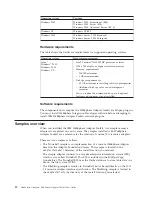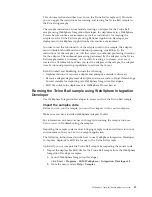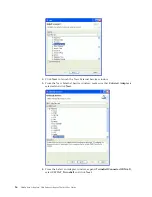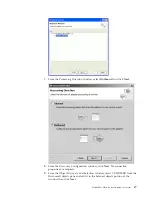
The connectivity subcomponent interacts with the target enterprise information
system’s specific libraries and functionality. The subcomponent is exposed to the
application interface component through standard JCA CCI interfaces, which
include Connection, ConnectionFactory, Interaction and InteractionSpec for
outbound processing and ResourceAdapter and ActivationSpecWithXid for the
inbound event processing.
JCA connector Data exchange SPI (DESPI) subcomponent
The data exchange subcomponent of the JCA connector component includes
functionality for sending or receiving data from the application component through
the data exchange interface (DESPI). This interface is format and runtime neutral,
and permits any kind of structured or streamed data to be moved between the
connector and the application. The connector component understands the data
format of the EIS and is able to convert it to invocations of Data Exchange SPI. The
main advantage of DESPI is its high efficiency rate of passing data between
components without introducing any intermediate format.
Common services and adapter foundation classes
The adapter foundation classes provide base adapter implementation ensuring that
all the interfaces required by the contracts supported by the Connector component
are provided.
As shown in Figure 3 on page 5, the adapter foundation classes provide support
across all the elements of the connector component, including the JCA interfaces, as
well as data exchange interfaces implementing Data Exchange SPI (DESPI) and
various quality of service.
The adapter foundation classes support all the required JCA contracts for outbound
and inbound connectivity. For the outbound interactions, the support includes
standard create, retrieve, update, and delete (CRUD) operations through the
Command Manager, the application sign-on and transactions when supported by
EIS. For the inbound connectivity, support includes reliable event delivery to the
endpoint, support for polling as well as event listening pattern.
The adapter foundation classes provide full support for DESPI with full
implementation of required interfaces including abstract representation of the
metadata. An important component of the runtime environments, and thus
architecture, is monitoring and problem determination support. The adapter
foundation classes provide a set of utility classes for robust and consistent logging
and tracing in different deployment scenarios by hiding the underlying runtime
implementation.
The adapter foundation classes also support various monitoring and events and
allow all adapters take advantage of that functionality. The supported quality of
service includes Performance Monitoring Infrastructure (PMI), Application
Response Measurement (ARM) and Common Event Infrastructure (CEI). For more
information on the monitoring capabilities available, see “Monitoring and
measuring performance” on page 181.
Application interface component
The application interface component bridges the runtime environment and the
connector component. It enables invocation of the connector from the clients, using
6
WebSphere Adapters: WebSphere Adapter Toolkit User Guide
Summary of Contents for WebSphere Adapters
Page 2: ......
Page 6: ...iv WebSphere Adapters WebSphere Adapter Toolkit User Guide...
Page 220: ...214 WebSphere Adapters WebSphere Adapter Toolkit User Guide...
Page 224: ...218 WebSphere Adapters WebSphere Adapter Toolkit User Guide...
Page 225: ......
Page 226: ...Printed in USA...













































